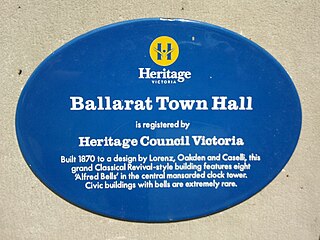
Federation Square is a venue for arts, culture and public events on the edge of the Melbourne central business district. It covers an area of 3.2 ha at the intersection of Flinders and Swanston Streets built above busy railway lines and across the road from Flinders Street station. It incorporates major cultural institutions such as the Ian Potter Centre, Australian Centre for the Moving Image (ACMI) and the Koorie Heritage Trust as well as cafes and bars in a series of buildings centred around a large paved square, and a glass walled atrium.

The Victoria State Government, also referred to as the Victorian Government, is the executive government of the Australian state of Victoria.
VicRoads is a government joint venture in the state of Victoria, Australia. In the state, it is responsible for driver licensing and vehicle registration. It is owned and operated through a joint venture between the Victorian government and a consortium made up of Aware Super, Australian Retirement Trust and Macquarie Asset Management.
ACMI, formerly the Australian Centre for the Moving Image, is Australia's national museum of screen culture including film, television, videogames, digital culture and art. ACMI was established in 2002 and is based at Federation Square in Melbourne, Victoria.

Heritage Victoria is a branch of the Victorian Department of Transport and Planning. It is the regulator responsible for administering the Heritage Act 2017. The Heritage Act provides for the protection and conservation of the cultural heritage of Victoria and establishes the Victorian Heritage Register and Heritage Inventory. The Register is a list of places and objects which are of significance to the State of Victoria. The Inventory is a list of known historical archaeological sites. Both statutory lists can be searched via the Victorian Heritage Database.

The Public Transport Corporation (PTC) was a Victoria State Government owned statutory authority formed under the Transport Act 1983 which operated passenger and freight trains, trams and bus services.
Jill Elizabeth Bilcock, is an Australian film editor. She was nominated for BAFTA Awards for Strictly Ballroom (1992), Romeo + Juliet (1996), and Moulin Rouge! (2002), and Elizabeth (1998). In 2007 she won the Australian Film Institute International Award for Excellence in Filmmaking.
Screen NSW, formerly known as the New South Wales Film and Television Office, or FTO, and before that the New South Wales Film Corporation, is a brand name that is part of Create NSW, an agency of the Government of New South Wales that is responsible for supporting and promoting the arts, artists and the various cultural bodies within the state of New South Wales in Australia. Screen NSW assists, promotes and strengthens the screen industry in the state of New South Wales. It was previously an agency in its own right, but since 1 April 2017 has been part of Create NSW. The name "Screen NSW" ceased to exist within Create NSW between that date and September 2019, when a restructure resurrected the brand. As of July 2022, Kyas Hepworth is the Head of Screen NSW.
Transport law is the area of law dealing with transport. The laws can apply very broadly at a transport system level or more narrowly to transport things or activities within that system such as vehicles, things and behaviours. Transport law is generally found in two main areas:

Norman Henry Lacy is an Australian former politician, who was a Minister in the Hamer and Thompson Cabinets of the Victorian Government from May 1979 to April 1982.
The Melbourne Arts Precinct is home to a series of galleries, performing arts venues and spaces located in the Southbank district of Melbourne, Victoria, Australia. It includes such publicly-funded venues as Arts Centre Melbourne, National Gallery of Victoria and Southbank Theatre, along with various offices and training institutions of arts organisations.

The Victorian College of the Arts (VCA) is the arts school at the University of Melbourne in Australia. It is part of the university's Faculty of Fine Arts and Music (FFAM). It is located near the Melbourne city centre on the Southbank campus of the university. The VCA Film and Television School was founded in 1991, after it assumed ownership and management of the Swinburne Film and Television School.

The Department of Transport (DOT) was the government agency responsible for the coordination, integration and regulation of the transport system in the State of Victoria, Australia. The department generated planning, policy, and legislation for transport in Victoria. As a result, the department drove the integration of Victoria's transport land and water transport systems and the delivery of public transport, road and port services and associated activities across the State. The department's stated mission was "Building a safer, fairer and greener transport system for all Victorians to create a more prosperous and connected community."

The Director of Public Transport was the head of the Public Transport Division (PTD) of the Victorian Department of Transport. PTD was the government agency responsible for promoting, providing, coordinating and regulating public transport in the state of Victoria, Australia between August 1999 and June 2013. The Director of Public Transport was created as a statutory office supported by staff of the Department of Transport.
Roger Savage is an Australian sound engineer. He was nominated for an Oscar for his work on Moulin Rouge! in 2002.
Jill Robb was an English-born Australian film producer and executive who worked mostly in Australia.
John Geoffrey Smithies is an Australian artist and arts manager. He is a sculptor and installation artist who has been director of the State Film Centre of Victoria, but is best known as the founding director of the Australian Centre for the Moving Image.

Mitu Bhowmick Lange is an Indian-Australian filmmaker, film producer and founder-director of Mind Blowing Films, a film distribution company that focusses on distribution of local content to Australia, New Zealand and Fiji. She is the founder and director of Indian Film Festival of Melbourne, a Victorian government funded annual film festival that started in 2010 and the Victorian Government came on board in 2012. She has also provided line production services for the Hindi films Salaam Namaste (2005), Koi Aap Sa (2005), Chak De India (2007), Bachna Ae Haseeno (2008), Main Aurr Mrs Khanna (2009) and Love Aaj Kal (2009). Lange was awarded Jill Robb Screen Leadership Award for 2017 from Film Victoria. Mitu Bhowmik was appointed as a board of member at WIFT Australia in February 2022. Mitu is also a board member at Film Vic Australia and the part of the committee for Natalie Miller Fellowship (NMF). In 2023, Lange received the award of Member of the Order of Australia (AM) for service to performing arts through film.
Susan Mary Maslin is an Australian screen producer. She is best known for her feature films Road to Nhill (1997), Japanese Story (2003), and The Dressmaker (2015), but has produced or executive produced more documentary films than fiction features. She is co-founder of the company Film Art Media, established in 2008 with her creative and business partner Daryl Dellora, based in Melbourne.









